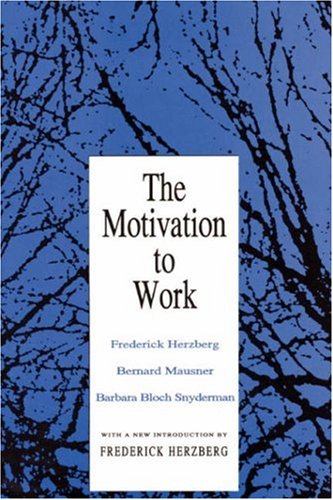
Quality work that fosters job satisfaction and health enjoys top priority in industry all over the world. This was not always so. Until recently analysis of job attitudes focused primarily on human relations problems within organizations. While American industry was trying to solve the unsolvable problem of avoiding interpersonal dissatisfaction, problems with the potential for solution, such as training and quality production, were ignored. When first published, The Motivation to Work challenged the received wisdom by showing that worker fulfillment came from achievement and growth within the job itself. In his new introduction, Herzberg examines thirty years of motivational research in job-related areas.
Based on workers’ accounts of real events that have made them feel good or bad on the job, the findings of Herzberg and his colleagues have stimulated research and controversy that continue to the present day. The authors surprisingly found that while a poor work environment generated discontent, improved conditions seldom brought about improved attitudes. Instead, satisfaction came most often from factors intrinsic to work: achievements, job recognition, and work that was challenging, interesting, and responsible.
The evidence marshaled by this volume called into question many previous assumptions about job satisfaction and worker motivation. Feelings about intrinsic and extrinsic factors could not be validly averaged on a single scale of measurement. Motivation and performance are not merely dependent upon environmental needs and external rewards. Frederick Herzberg and his staff based their motivation—hygiene theory on a variety of human needs and applied it to a strategy of job enrichment that has widely influenced motivation and job design strategies. Motivation to Work is a landmark volume that is of enduring interest to sociologists, psychologists, labor studies specialists, and organization analysts.

The Motivation to Work What do employees really want from their jobs? The answers might surprise you, as they did researchers and business owners when social scientist Frederick Herzberg published this seminal work about employee motivation in 1959. Contrary to what you might think, people aren’t seeking only money and perks. Most workers’ real motivation comes from the desire for self-actualization, achievement and recognition for a job well done. Modern readers will find much that is prescient in Herzberg’s…
Basis for my research Not only did I include this in the literature review portion of my research project on retention and turnover, but it really formed the basis of several aspects of my research on turnover and worker satisfaction. I enjoyed it so much after borrowing from the library and reading it that I had to have a copy for myself. Many are quick to reject Herzberg’s two-factor theory, but it’s hard to go wrong in using what you’ll learn from his results and conclusions in dealing with worker motivation…
A Major Contribution to Understanding Motivation Herzberg’s seminal work is both robust and enduring. Few ideas about the workplace have offered such insight and wisdom… as well as misunderstanding and controversy. His classic, “One More Time… How Do You Motivate Employees?” is the number one most requested article in the history of the Harvard Business Review and has been republished multiple times during the past four decades. This is obviously a message management needs to relearn time and again.Ultimately, the core value…